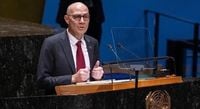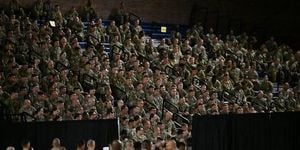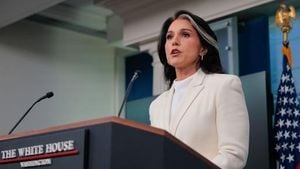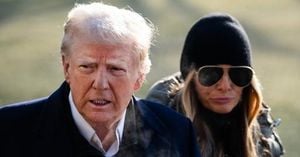The International Criminal Court (ICC) finds itself at the center of a diplomatic storm after the United States, under President Donald Trump’s administration, imposed a new round of sanctions on four of its senior officials. The move, announced by Secretary of State Marco Rubio on August 20, 2025, targets two judges—Kimberly Prost of Canada and Nicolas Guillou of France—and two deputy prosecutors, Nazhat Shameem Khan from Fiji and Mame Mandiaye Niang from Senegal. All four have played pivotal roles in ICC investigations into alleged war crimes committed by U.S. and Israeli officials, setting off a fierce global debate over the future of international justice.
The sanctions, which freeze any assets these individuals may hold in U.S. jurisdictions and bar them from traveling to the United States, are the latest in a series of escalating measures by the Trump administration against the Hague-based court. According to the Associated Press, these actions follow previous penalties imposed on the ICC’s former chief prosecutor, Karim Khan, and four other tribunal judges. In total, nine ICC officials have now been blacklisted—a designation typically reserved for terrorists, kleptocrats, and drug traffickers.
Secretary Rubio justified the administration’s actions in stark terms: “These individuals are foreign persons who directly engaged in efforts by the International Criminal Court to investigate, arrest, detain, or prosecute nationals of the United States or Israel, without the consent of either nation,” he said. Rubio further pledged that the administration would “continue to take whatever actions we deem necessary to protect our troops, our sovereignty, and our allies from the ICC’s illegitimate and baseless actions.”
The U.S. government’s ire was provoked by two major ICC investigations. Judge Prost was sanctioned for authorizing an investigation into crimes allegedly committed by U.S. personnel in Afghanistan, a probe that has been dormant since September 2021. Judge Guillou, meanwhile, presides over the pre-trial chamber that issued arrest warrants on November 21, 2024, for Israeli Prime Minister Benjamin Netanyahu and former Defense Minister Yoav Gallant, accusing them of war crimes and crimes against humanity in Gaza. The court cited, among other things, the starvation of civilians as a weapon of war and intentional attacks against a civilian population.
Prosecutors Khan and Niang were penalized for continuing the investigation into Israel’s actions in Gaza, including upholding the arrest warrants for Netanyahu and Gallant. These cases have drawn sharp rebukes from both the U.S. and Israeli governments, neither of which is a party to the Rome Statute—the treaty that established the ICC in 2002. Israel’s Prime Minister Netanyahu welcomed the U.S. move, calling it “a firm measure against the mendacious smear campaign against the State of Israel and the IDF, and for truth and justice.” Israeli Defense Minister Israel Katz echoed this sentiment, declaring that the new penalties sent a message that the United States and Israel would not bow to what he termed the court’s “shamelessly corrupt political persecution.”
The Trump administration’s latest sanctions stem from an executive order signed in February 2025, following the ICC’s issuance of arrest warrants for Netanyahu and Gallant. President Trump argued that the court had “engaged in illegitimate and baseless actions targeting America and our close ally Israel,” and insisted that the ICC had no jurisdiction over either country, given their non-membership in the court. This position, however, has not been universally embraced even among America’s allies. France’s Foreign Ministry publicly called for the withdrawal of the sanctions, and international legal experts have warned that such measures risk undermining decades of work to hold governments accountable under a single global framework.
The ICC itself responded with strong words, describing the sanctions as “a flagrant attack against the independence of an impartial judicial institution” and “an affront against the Court’s states parties, the rules-based international order and, above all, millions of innocent victims across the world.” The United Nations also weighed in on the dispute. UN spokesman Stephane Dujarric stated, “We firmly believe that the ICC is a key pillar of international criminal justice, and we respect their work. The decision imposes severe impediments on the functioning of the office of the prosecutor in respect for all the situations that are currently before the court.”
Further condemnation came from UN High Commissioner for Human Rights Volker Türk, who called the U.S. sanctions “an assault on the rule of law and [one that] corrodes justice.” Türk urged not only the withdrawal of the sanctions but also called on other countries to take immediate steps to protect ICC officials and human rights defenders from such measures. “Those working to document, investigate and prosecute serious violations of international law should not have to work in fear,” he emphasized.
While the ICC has issued arrest warrants for senior Israeli leaders, it has also targeted Hamas figures, reflecting its mandate to investigate and try individuals charged with genocide, war crimes, crimes against humanity, and the crime of aggression. The court’s reach, however, is limited by its lack of enforcement powers and the non-cooperation of some states. As The New York Times noted, “The court has no police force to make arrests, and neither Israel nor its chief ally, the United States, is among its member nations.”
Critics of the U.S. approach, such as international lawyer Nomi Bar-Yaacov of the Geneva Center for Security Policy, argue that the administration “supports rulings that are aligned with its stated interests and tries to torpedo a judgment or indictment that it is not in favor of. It is a serious step toward the erosion of an international rules-based order.” Meanwhile, supporters of the sanctions, including Israeli officials, see them as a necessary defense against what they perceive as politically motivated prosecutions.
The controversy surrounding the ICC sanctions highlights deep divisions in the international community over the court’s legitimacy and the mechanisms for holding state actors accountable. Some countries and legal scholars view the ICC as a vital institution for global justice, while others—most notably the U.S. and Israel—see it as overstepping its bounds and infringing on national sovereignty. The debate is further complicated by ongoing conflicts, such as Israel’s war with Hamas in Gaza and the legacy of the U.S. military’s actions in Afghanistan.
As the world watches the unfolding standoff, the future of the ICC and the international legal order it represents remains uncertain. The latest U.S. sanctions have not only intensified the debate over the court’s authority but also raised fundamental questions about the balance between national sovereignty and the pursuit of justice for the gravest crimes. For now, the ICC’s work continues, but the risks and pressures faced by its officials have never been higher.





